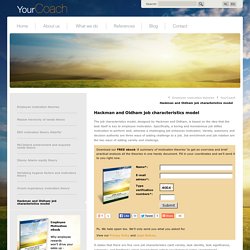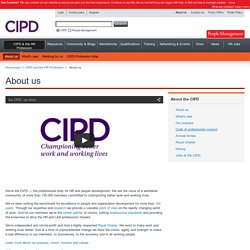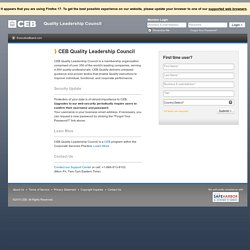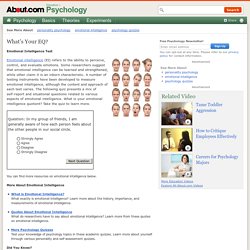

Hackman and Oldham job characteristics model. The job characteristics model, designed by Hackman and Oldham, is based on the idea that the task itself is key to employee motivation.

Specifically, a boring and monotonous job stifles motivation to perform well, whereas a challenging job enhances motivation. Variety, autonomy and decision authority are three ways of adding challenge to a job. Job enrichment and job rotation are the two ways of adding variety and challenge. It states that there are five core job characteristics (skill variety, task identity, task significance, autonomy, and feedback) which impact three critical psychological states (experienced meaningfulness, experienced responsibility for outcomes, and knowledge of the actual results), in turn influencing work outcomes (job satisfaction, absenteeism, work motivation, etc.). Management Theories. About us - About us. We’re the CIPD — the professional body for HR and people development.

We are the voice of a worldwide community of more than 135,000 members committed to championing better work and working lives. We’ve been setting the benchmark for excellence in people and organisation development for more than 100 years. Through our expertise and research we provide a valuable point of view on the rapidly changing world of work. And for our members we’re the career partner of choice, setting professional standards and providing the know-how to drive the HR and L&D professions forward. We’re independent and not-for-profit and hold a highly respected Royal Charter. Learn more about our purpose, vision, mission and values What we do and how we work For an overview of the work we do and how we do it, download our annual review or find out about: What we stand for The CIPD acronym stands for the Chartered Institute of Personnel and Development, but today we're known simply as the CIPD.
Employee Survey Experts. 10 Characteristics of High-Performing Teams Most members of high-performing teams report that it's fun and satisfying to work on collaborative teams because they are asked to contribute at their highest potential and they learn a lot along the way.

Characteristics of high-performing teams include the following: People have solid and deep trust in each other and in the team's purpose -- they feel free to express feelings and ideas.Everybody is working toward the same goals.Team members are clear on how to work together and how to accomplish tasks.Everyone understands both team and individual performance goals and knows what is expected.Team members actively diffuse tension and friction in a relaxed and informal atmosphere.The team engages in extensive discussion, and everyone gets a chance to contribute -- even the introverts.Disagreement is viewed as a good thing and conflicts are managed.
A team charter paves the way for collaborative success by providing clarity that builds trust and accountability. Hackman and Oldham job characteristics model. THE FOURTEEN POINTS FOR MANAGEMENT. Qmp_2012.pdf. CEB - the leading member-based advisory company. CEB Quality Leadership Council. Has invited you to access the CEB Quality Leadership Council.

CEB Quality Leadership Council is a membership organization comprised of over 350 of the world's leading companies, serving 4,500 quality professionals. CEB Quality delivers unbiased guidance and proven tactics that enable Quality executives to improve individual, functional, and corporate performance. Security Update Protection of your data is of utmost importance to CEB. Upgrades to our web security periodically require users to confirm their username and password. Learn More CEB Quality Leadership Council is a CEB program within the Corporate Services Practice. Contact Us Thank you for your submission. The Three Pillars of High Performance Teams. Simon Sinek: How great leaders inspire action. 09_SCARF_in_2012_US.pdf. What's Your EQ? - Emotional Intelligence Test. Emotional intelligence (EI) refers to the ability to perceive, control, and evaluate emotions.

Some researchers suggest that emotional intelligence can be learned and strengthened, while other claim it is an inborn characteristic. A number of testing instruments have been developed to measure emotional intelligence, although the content and approach of each test varies. The following quiz presents a mix of self-report and situational questions related to various aspects of emotional intelligence. What is your emotional intelligence quotient?
Take the quiz to learn more. <table align="center" cellpadding="3" width="350" border="1"><tr><td align="left"><div><b>This Quiz requires Javascript</b></div><blockquote> You either have Javascript disabled<br />or the browser you are using does not<br />support Javascript. You can find more resources on emotional intelligence below. Employeeengagement_mg_ddi.pdf. Simon Sinek. NYT and WSJ Bestselling Author of Drive. Leaders Eat Last: Why Some Teams Pull Together and Others Dont: Simon Sinek: 9781591845324: Amazon.com: Books. HBR, Quality and Culture.